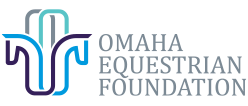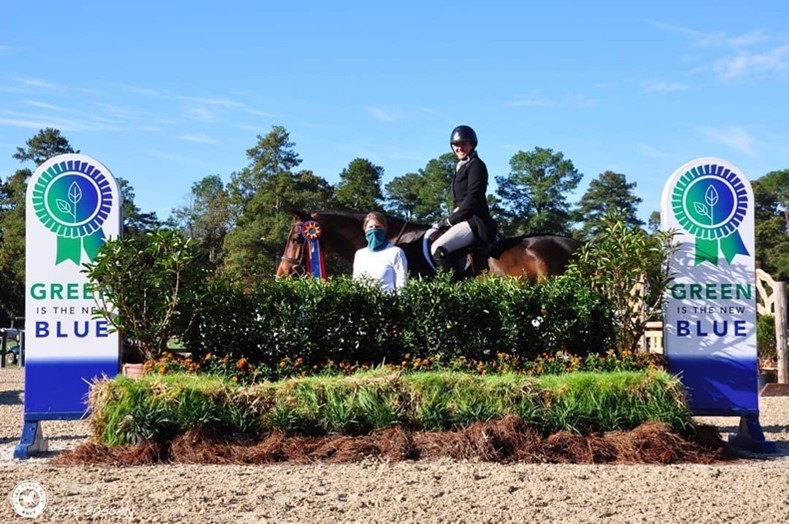by Stephanie Bulger of Green Is the New Blue
Green Is the New Blue is a non-profit dedicated to reducing the environmental impact of horse shows, educating equestrians, and supporting the movement towards a sustainable sport. Here are a few of our ideas that have been put into action at our partner organizations and show facilities:
The purpose of the “Living Jump” is to promote biodiversity and support species that enhance ecosystem resilience.
Biodiversity describes the overall variety of living things in the ecosystem — from microorganisms to plants to horses and their riders — and is important because it provides vital resources such as food, water, shelter, medicine, and fuel. A biodiverse environment is also more resilient in the face of disaster. When equestrians source native plants within the course design and farm landscaping processes, they help to sustain the local environments that, in turn, sustain human life.
To build a “Living Jump”, source plants from a local nursery and use native species that support pollinators and create habitats for other insects, such as butterflies. To add to sustainability, many species included in your “Living Jump” can be replanted for use the following years. If you do not jump, this practice can be applied to other areas around your farm or horse show.
Green is the New Blue's “Refuse to Use” campaign highlights the necessity of reusing to use single-use plastics, sourcing alternative products, and reusing material whenever possible.
“It’s so important to not just recycle but to reduce the need for recycling,” explained R. Scot Evans, the creative director for Green is the New Blue. “The chilling facts are real! There are 8 trillion pieces of single-use plastic currently in the oceans around the world. “It’s no longer about just picking up a piece of plastic and recycling it, it’s about refusing to use it,” continued Evans, who explained that many plastic bottles never actually get recycled, even if placed into recycling bins.
In order to combat single-use plastics on the showgrounds, Green Is the New Blue implemented practices such as touch-free water refill stations. In a modified effort to combat Covid-19, our partners have provided Boxed Water Is Better™ and continue to keep riders hydrated.
We acknowledge that plastic and other recyclable materials may find their way onto the showgrounds. We have strategically placed recycling bins next to all trash cans at our partner events and allocated appropriate signage to improve participation.
With our partner horse shows, we work with food vendors to minimize waste and switch to more environmentally friendly product packaging. There are many affordable alternatives to single-use plastics that can be incorporated into equestrian and restaurant business practices. At the Aiken Horse Park, we collaborated with Angela and Kory Merrill of Perks With a Twist, now one of the horse show world’s leaders in sustainable food service. Every serving product used in the café is now compostable, comprised of materials such as sugar cane.
The “Ribbon Recycle” program minimizes waste and supports the concept of a circular economy.
For many competitors, horse show ribbons are prized possessions that represent distinct moments and achievements. However, this is not always the case. Ribbons are often collected at the ring to display in a barn's setup, only to be discarded at the end of the show. To combat this waste, show organizers may place Ribbon Recycle bins around the show grounds for an easy return at the end of the show. Returned ribbons will be steamed, organized, and awarded at future competitions until they find forever homes with riders who will cherish the memories they represent. If you already have a large collection of ribbons that you no longer wish to keep, consider donating to a local camp or therapeutic riding program to award rider achievements.
Green Is the New Blue encourages responsible water use at horse show wash racks and around the barn.
Natural disasters such as wildfires have become increasingly common, as we face environmental conditions such as drought. With a limited supply of freshwater, it is highly valuable to conserve this necessary resource. We strategically place signs in wash racks encouraging users to turn off the water completely when not in use to minimize leakage and overall consumption. It is common to see water running in the wash racks, while they are not actively being sprayed onto the horse. If the competition facilities allow for an attachment nozzle, keep one in your wash bucket to screw on for easy use during bathing.

